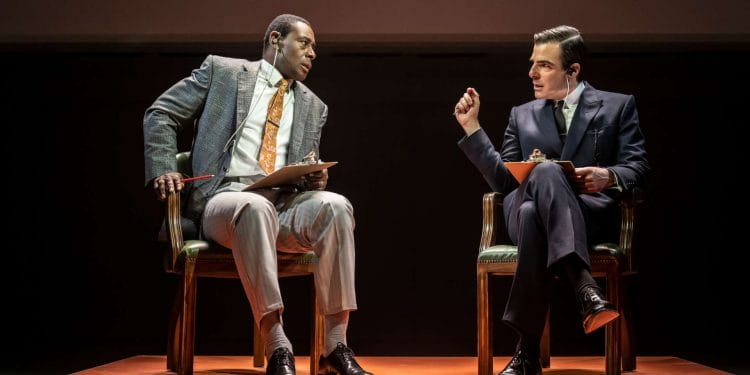 Divisions between the right and left of politics, both here and in the US, might feel like they have reached a point of no return, and in the West End transfer of Best of Enemies, writer James Graham and director Jeremy Herrin look back to 1968 and pinpoint the moment that the modern culture war may have started. The production, which originally played at the Young Vic, is now playing a limited season at the West End’s Noël Coward Theatre.
Divisions between the right and left of politics, both here and in the US, might feel like they have reached a point of no return, and in the West End transfer of Best of Enemies, writer James Graham and director Jeremy Herrin look back to 1968 and pinpoint the moment that the modern culture war may have started. The production, which originally played at the Young Vic, is now playing a limited season at the West End’s Noël Coward Theatre.
Today, the US television network ABC has the most watched nightly newscast in the world, but in the late 1960’s they were struggling for audience share against better resourced rivals. The opening scenes of Best of Enemies playfully imagine boardroom scenes where executives try to solve this problem.
Solve it they did, starting with their coverage of the Democratic and Republican party conventions. In a move away from the normal form of neutral reporting, ABC hired two political commentators for a series of debates, something that would pass without comment now. On the right William F Buckley Jr, and on the left Gore Vidal. Over a number of nights the pair would enthral audiences with their verbal sparring, until one night it went too far, and slurs of ‘Crypto-Nazi’ and ‘queer’ were broadcast live into American homes.
Graham, well known for his political plays, took inspiration for the play from a 2015 documentary, and the resulting stage version plays out like a docu-drama. The debates themselves are recreated, though obviously not in their entirety, verbatim. But we also go behind the scenes, into the board rooms, control rooms and bedrooms where the really interesting stuff happened.
Aretha Franklin, Andy Warhol and Bobby Kennedy are a few of the famous faces who make appearances, drawing attention to the troubles that faced the country at that time; the war in Vietnam, and civil rights featuring heavily. There is much exposition, and the recreation of the on-screen events sometimes feel less engaging than the off-screen drama, but still, they are done well, through projections in Bunny Christie’s innovative set design.
Buckley, a prime example of a privileged white conservative, is played with magnificent steadfastness by David Harewood. Perhaps as a result of the fluid casting, Harewood never attempts to imitate Buckley, but presents an interpretation of the commentator. On the other hand, Zachary Quinto makes a formidable West End debut portraying Gore Vidal with pin-point accuracy, from the voice right down to the most minute of mannerisms.
Best of Enemies finds parallels between American politics then and now; a line about ‘the most disastrous man in the country’ rising to power if he makes good TV, gets an extra wry laugh from the audience. It is, for the most part, a thrilling and revealing look at past events that have paved the way for a future we now find ourselves living in.

















